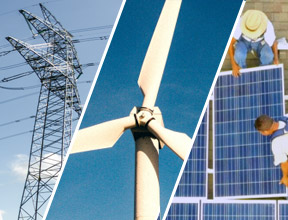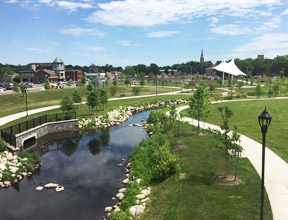
- Clean energy refers to electricity, heating, and fuels supplied from renewable energy sources such as wind and solar power, geothermal, hydropower, and other decarbonized fuels, as well as energy saved by energy efficiency measures. Shifting to clean energy is crucial to head off climate change, protect public health, and make our communities more resilient and equitable.
- Polluting and carbon-emitting energy resources historically have been sited in low-income communities, creating inequitable living conditions and health outcomes. Further, older homes common in these communities tend to be less energy efficient. Without efficiency improvements, residents are forced to consume more energy and spend a higher proportion of their income on energy bills. As Connecticut shifts to clean energy sources, addressing these inequities is important.
- With climate change increasing the frequency and intensity of extreme weather events, energy resilience – the ability prepare for, adapt to, and recover from any energy disruptions caused by these weather events – is increasingly important.
- The Office of Energy Supply and Infrastructure, Office of Buildings and Transportation Decarbonization and the Office of Affordable Housing Energy Retrofits play a critical role in Connecticut’s transition to clean energy.

Integrated Resource Plan
The Integrated Resource Plan comprises an assessment of the future electric needs and a plan to meet those future needs. It is “integrated” in that it looks at both demand side (conservation, energy efficiency, etc.) resources as well as the more traditional supply side (generation/power plants, transmission lines, etc.) resources in its recommendations on how best to meet future electric energy needs and climate goals of the state. Learn More

Procurements for Grid-Scale Renewable Energy Resources
DEEP’s Procurements for Grid-Scale Renewable Energy Resources bring clean resources online, diversify our fuel sources to improve reliability, and decarbonize the electric sector. Learn More

The Shared Clean Energy Facility (SCEF) Program
The SCEF Program was established by Public Act 18-50 Section 7(c) to support the deployment of renewable energy resources and provide on-bill electric savings for participating subscribers. The Statewide SCEF Program began in 2020 and includes an annual clean energy procurement for six years. Learn More
 The Microgrid and Resilience Grant and Loan Program
The Microgrid and Resilience Grant and Loan Program
The Microgrid and Resilience Grant and Loan Program creates local distributed energy generation for critical facilities. A Microgrid generally operates while connected to the grid but can disconnect and operate in island mode on its own if there is a crisis such as a power outage or a major storm.
Sustainable, Transparent, and Efficient Practices (STEPS) for Solar Development
Sustainable, Transparent, and Efficient Practices (STEPS) for Solar Development identifies policies, legislative actions, and best practices, particularly related to the procurement, siting, and permitting of ground-mounted solar systems in Connecticut. Learn More
Siting Clean Energy on Connecticut Brownfields
Siting Clean Energy on Connecticut Brownfields is particularly effective since resources like solar can require large sites for installation and help reuse land with limited development opportunities. Learn More

The Regional Greenhouse Gas Initiative (RGGI)
The Regional Greenhouse Gas Initiative (RGGI) is a cooperative effort among the states of Connecticut, Delaware, Maine, Maryland, Massachusetts, New Hampshire, New Jersey, New York, Rhode Island, Vermont, and Virginia (participating RGGI states) to cap and reduce power sector CO2 emissions.
Learn More
Renewable thermal energy
Renewable thermal energy is a key element of Connecticut’s deployment of clean energy. A wide range of technologies – from heat pumps to biofuels to solar water heating – harvest energy from the environment to provide buildings with efficient, low-carbon heating and cooling. Learn More
DEEP is regularly involved in regional electricity matters, including participation before the Federal Energy Regulatory Commission and the region’s grid operator, ISO New England, through the New England Power Pool (NEPOOL) stakeholder process to advocate for ways to ensure a continued transition to a cleaner electricity grid that is reliable, equitable, and affordable. With these efforts, DEEP helped prepare the New England States’ Vision for a Clean, Affordable, and Reliable 21st Century Regional Electric Grid, which included the issuance of a Vision Statement, a report to the region’s governors, and a series of technical meetings examining wholesale market design, governance reforms, transmission planning, and environmental justice and equity issues.

 The Public Utilities Regulatory Authority regulates the rates and services of Connecticut’s investor-owned electricity, natural gas, water, and telecommunication companies and is the franchising authority for the state’s cable television companies. PURA balances the public’s right to safe, adequate, and reliable utility service at reasonable rates with the provider’s right to a reasonable return on its investment. PURA also oversees utility-administered programs supporting on-site renewable energy deployment, like the Residential Renewable Energy Solutions.
The Public Utilities Regulatory Authority regulates the rates and services of Connecticut’s investor-owned electricity, natural gas, water, and telecommunication companies and is the franchising authority for the state’s cable television companies. PURA balances the public’s right to safe, adequate, and reliable utility service at reasonable rates with the provider’s right to a reasonable return on its investment. PURA also oversees utility-administered programs supporting on-site renewable energy deployment, like the Residential Renewable Energy Solutions.
 The Connecticut Green Bank offers incentives and innovative low-cost financing to encourage homeowners, companies, municipalities, and other institutions to support both renewable energy and energy efficiency.
The Connecticut Green Bank offers incentives and innovative low-cost financing to encourage homeowners, companies, municipalities, and other institutions to support both renewable energy and energy efficiency.
 The HeatSmart Connecticut Program is a community-based outreach and education program that promotes the adoption of clean heating and cooling technologies in Connecticut.
The HeatSmart Connecticut Program is a community-based outreach and education program that promotes the adoption of clean heating and cooling technologies in Connecticut.
 NESCOE represents the collective perspective of the six New England Governors in regional electricity matters and advances the New England states’ common interest in the provision of electricity to consumers at the lowest possible prices over the long-term, consistent with maintaining reliable service and environmental quality.
NESCOE represents the collective perspective of the six New England Governors in regional electricity matters and advances the New England states’ common interest in the provision of electricity to consumers at the lowest possible prices over the long-term, consistent with maintaining reliable service and environmental quality.
 The Energy Efficiency Board is a group of advisors who evaluate, advise, and assist the state’s utility companies in developing and implementing comprehensive, cost-effective energy conservation and market transformation plans to help Connecticut consumers reduce and decarbonize energy use in their homes and businesses.
The Energy Efficiency Board is a group of advisors who evaluate, advise, and assist the state’s utility companies in developing and implementing comprehensive, cost-effective energy conservation and market transformation plans to help Connecticut consumers reduce and decarbonize energy use in their homes and businesses.
Content last updated July 2022






